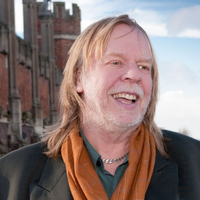
Rick Wakeman
Born Richard Christopher Wakeman 18 May 1949 Perivale, Middlesex, England Occupations Keyboardistsongwriterproducertelevision and radio presenterauthor Years active 1969–present Richard Christopher Wakeman CBE (born 18 May 1949) is an English keyboardist and composer best known as a member of the progressive rock band Yes across five tenures between 1971 and 2004, and for his prolific solo career. AllMusic describes Wakeman as a "classically trained keyboardist extraordinaire who plied his trade with Yes and developed his own brand of live spectacular in a solo act." Born and raised in West London, Wakeman quit his studies at the Royal College of Music in 1969 to become a full-time session musician. His early sessions included "Space Oddity", among other tracks, for David Bowie, and songs by Elton John, Marc Bolan, Cat Stevens, and Lou Reed. In 1970, Wakeman joined the folk rock group the Strawbs, during which his virtuosity gained national press coverage. He left in 1971 to join Yes, with whom he played on some of their most influential albums across two stints until 1980. During this time Wakeman began a solo career in 1973 and became an iconic and prominent figure in progressive rock. His highest-selling and most acclaimed albums are his first three: The Six Wives of Henry VIII (1973), the UK number-one Journey to the Centre of the Earth (1974), and The Myths and Legends of King Arthur and the Knights of the Round Table (1975), all concept albums. In 1974, he formed his band the English Rock Ensemble, with which he toured worldwide and continues to perform, and went on to score his first major film, Lisztomania (1975). Rick Wakeman1948年出生于英国。具有深厚古典钢琴功力,曾于英国皇家音乐学院就读。他融合键盘、古典钢琴、电子合成器等,甚至被和管弦乐团创作了多张前卫性的音乐专辑。
